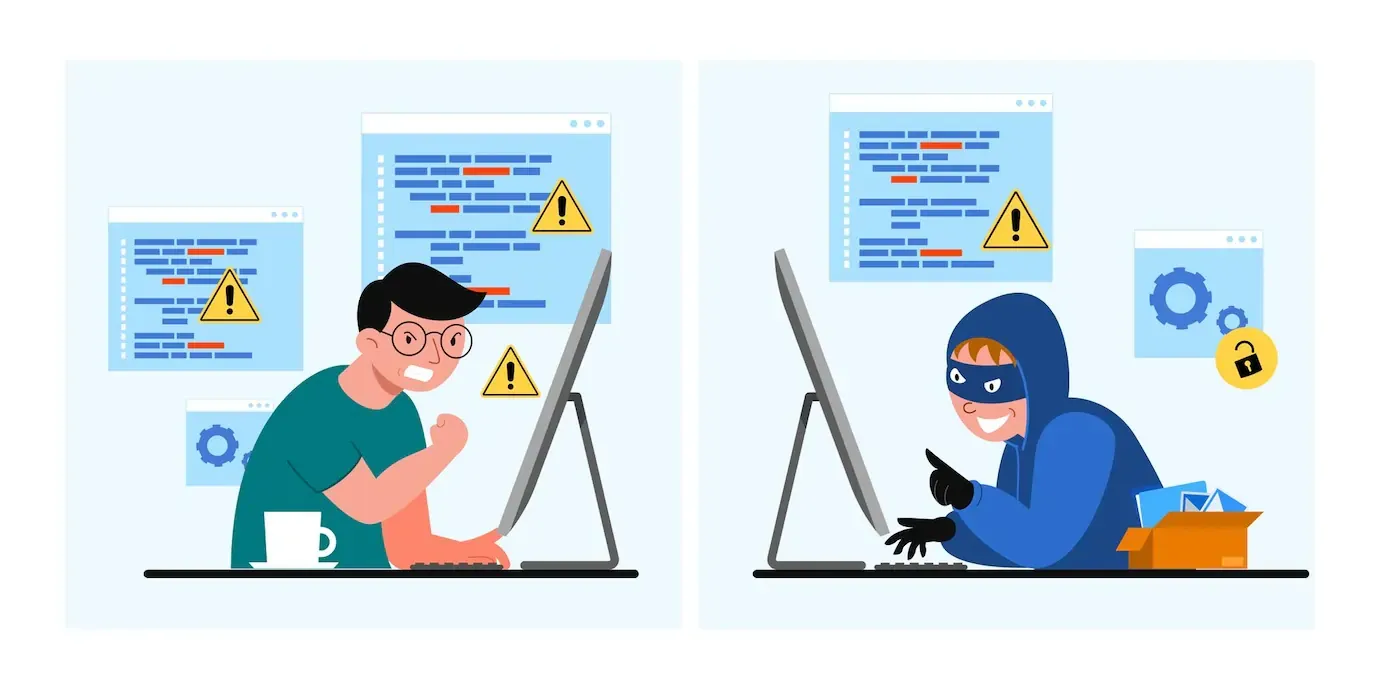
In today's digital world, cybersecurity is a top concern for individuals, organizations, and governments. One of the most critical aspects of cybersecurity is understanding the difference between hacking and ethical hacking.
Almost all of us have heard both these terms and would most probably be confused about what the difference is and how hacking can be ethical. To understand this, let’s take a look at both of them in detail and dive into the world of hacking and ethical hacking, exploring their differences and the role they play in maintaining a secure digital environment.
What is Hacking?
The technical definition of hacking is any activity that seeks to compromise a digital device or network. The individuals that are able to break through the security of the device are called Hackers. These devices include computers, phones, tablets, and other gadgets. In simpler terms, it is the act of exploiting the weakness of a digital device to gain unauthorized access of sorts. This includes everything from stealing information to even disruption and damage to infrastructure.
Having said that, not all hacking is illegal or evil. This can be used in a positive way as well.
What is Ethical Hacking?
To understand what ethical hacking is, it is important to understand the types of hacking.
- Black Hat Hacking: A type of malicious hacking which gains access to unauthorized networks with the goal of stealing data.
- White Hat Hacking: It is also known as ethical hacking, where hacking techniques are used to identify and fix weaknesses in networks and computers.
- Gray Hat Hacking: It refers to a type of hacking that aims to expose any vulnerabilities of computers and networks.
There are also other types of hacking, like script kiddie hacking, advanced persistent threat hacking, social engineering hacking, and malware.
Ethical Hacking or “White Hat Hacking” is the use of hacking techniques to identify any vulnerabilities in computer systems and fix them. This is done with permission from the system owners for its betterment. The main aim of this type of hacking is to improve the overall security of the system. While ethical hackers would use the same method as a black hat hacker, the intention is to help the security rather than to cause harm.
Legal Aspects of Hacking & Ethical Hacking
When we look at the legal aspects of hacking in general, it can be considered an illegal and punishable offense. This includes fines and even imprisonment. Ethical hacking, on the other hand, is legal, provided it is done with the prior permission of the system owner, followed by authorization from the same.
In case of ethical hacking, this permission must be in written form from the owner before attempting to do so. A legal contract is drawn up to protect both parties. This contract often includes the outline of the scope of testing along with any restrictions for the hacking. Ethical hackers are obligated to adhere to some ethical standards, which include principles like confidentiality and honest reporting of any vulnerability to the owner.
Skills Required for Hacking & Ethical Hacking
To be a successful hacker, one needs a couple of skills that will make this process possible. These can be broadly classified as technical skills and non-technical skills.

Technical Skills
- Programming Skills: To analyze a code, knowledge of coding languages is essential. This includes programming languages like Java, C++, Python, etc. They would help in creating codes that help in finding weaknesses and vulnerabilities in the software.
- Networking Knowledge: A basic understanding of how networks function will allow ease of approach for ethical hacking. Basics like DNS, routing, and TCP/IP would prove useful.
- Operating Systems & Their Working: An understanding of the different operating systems will help the hacker by providing security weaknesses. Some operating systems include Windows, Linux, and Mac OS.
- Reverse Engineering: If one has the ability to reverse engineer software or hardware, the hacker would automatically know the problems and shortcomings of the software.
- Social Engineering: Social engineering skills can be useful for manipulation to obtain sensitive information about unauthorized details.
Non-Technical Skills
- Critical Thinking: Ethical hackers need to be able to think critically and identify any weaknesses so that they can assess risks to develop new solutions.
- Attention to Detail: The eye to pay attention to detail is very important as any subtle vulnerabilities and loopholes are not to be overlooked by them.
- Communication: The hacker must also be able to communicate the weakness effectively with their client. They should also be able to communicate some level of technical concepts with the clients.
- Creativity: Many problems require a creative thought process which will require creative thinking for innovative solutions.
- Persistence: As the process of ethical hacking can be vexing, it is important to not lose hope and persist in their attempt. They need to be tenacious in their approach and identify the vulnerabilities.
- Ethics: As an ethical hacker, one of the most important aspects is to maintain ethics which includes honesty and integrity.
- Adaptability: Ethical hacking requires the ability to adapt and change to different scenarios, technologies, and security threats.
Interested in learning these skills and making your career as an Ethical Hacker? Make sure you enroll for a certified ethical hacking course.
What are the Similarities and Differences Between Hacking & Ethical Hacking?
While hacking and ethical hacking have main differences, there are some common points between them:
- Both hacking and ethical hacking require technical skills like networking and programming
- Methodology: hacking and ethical hacking both use a similar methodology which includes scanning, reconnaissance, and exposure of identity.
- Tools: both hacking and ethical hacking make use of the same/similar tools like port scanners, vulnerability scanners, and password crackers.
Despite these similarities, there are some important differences:
Hacking is an illegal act, whereas ethical hacking is a legal and ethical act. Hacking, which is done with malicious intent, is illegal. This includes gaining unauthorized information, access to different computers, stealing information, or even causing damage to physical property. This is done with a malicious intent to hurt or cause damage and to obtain inaccessible information, whereas ethical hacking is done with prior permission from the owner of the said devices in order to expose the weakness of these devices and networks.
The owner can then choose to work on these loopholes to strengthen the device and make it more secure. A white hat hacker also has a written acknowledgment of the permission to hack the device, along with the outline of what’s allowed and what’s not allowed. He/she is also obligated to report these security weaknesses to the owner.
Importance of Ethical Hacking
We have seen the meaning of ethical hacking and where it is useful. Now, let us take a look at the importance of ethical hacking in everyday scenarios.
Ethical hacking or white-hat hacking is also known as a “penetration test”, where owners of digital devices hire experts to identify and find vulnerabilities in computer systems and networks. This is done in a legal and ethical manner.
- Identifying Security Vulnerability: Hackers are hired to purposefully probe into the device and help organizations identify the vulnerabilities in their security systems that would otherwise be open to hackers to attack.
- Protection against Cyberattacks: On checking the security of the device, the feedback is taken and rectified so that the device and network become strengthened. The sensitive data is protected, and this will prevent cyber crimes.
- Ensuring Compliance: Organizations are made to improve their safety standards after ethical hacking. If a device is found to have weaknesses, they are to alter the security, and this will help in maintaining the industrial standards and comply with legal requirements.
- Saving Money: By identifying and addressing vulnerabilities, ethical hacking helps organizations save money that would otherwise be spent on recovery after a security breach.
- Building Trust: When a device owner allows an ethical hacker to hack the system, he/she is showing the customers that they take their security very seriously and are proactively identifying the vulnerabilities, addressing them, and fixing them. This would build trust between the consumer and the device owner.
Conclusion
In summary, we can say that hacking can be both ethical and malicious. While ethical hacking has a very important role in society to strengthen and improve the safety of the device, a black hat hacking attempt is aimed at maliciously capturing sensitive information. Both are two very contrasting sides of the same coin.
To learn more about ethical hacking, one can enroll in the best certified ethical hacking course.
FAQs
Q1. Which type of hacking is the best?
Hacking, as we know, can either be a white hat, black hat, or gray hat. It is important to remember that any form of hacking without prior permission and legal agreement is unethical and is a punishable offense. This is done with the intent to cause harm and steal information. It would be inappropriate to categorize any type of hacking as “best”. Organizations are to look out for ethical hackers to implement better security and to make sure that their security is foolproof.
Q2. Does hacking require coding?
Ideally, hacking requires some form of coding, but this mainly depends on the hacker and the tools used. Some types of hacking use existing or premade software and tools. Password cracking algorithms do not require separate coding as it has already been into one with an automated process.
Many of the advanced hacking techniques, however, require coding skills to customize the program or modify an existing one. Basically, not all hacking requires coding, but being able to code allows one to perform more advanced hacking that becomes more important for security breaches.
Q3. Why is ethical hacking a better alternative to hacking?
Hacking on its own without any form of permission is an illegal act and a punishable offense. This, on its own, makes it a good enough reason to choose ethical hacking. Ethical hackers are trained to think in a way that can uncover weaknesses with permission from the owners. This puts them in a legal bind to help the owners correct these weaknesses, unlike a black hat hacker who uses hacking with the intent to cause harm.